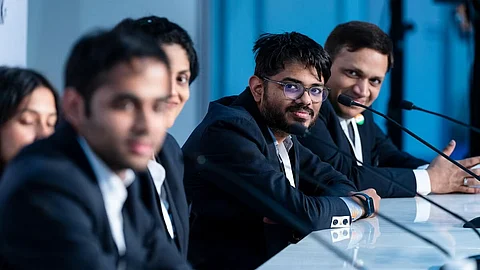

Indian team's non-playing captain and coach Srinath Narayanan (second from right) at the press conference after India's triumph.
FIDE
Grandmaster Srinath Narayanan, with his slim frame and boyish looks, would easily pass off as a member of the Indian Chess Team and many do a double take when they realise that the 30-year-old is the coach cum captain of the Indian team comprising of D Gukesh, R Praggnanandhaa, Arjun Erigaisi, Vidit Gujrathi and P Harikrishna which won the maiden gold medal for India at the 45th Chess Olympiad at Budapest Sunday night.
The multi-talented Srinath won gold medals in age category events, won a few Open International events and after earning the GM norm in 2017, changed track from being a player to a coach in 2018.
Four of the five players are fielded for a round and it is the decision of the coach/captain which plays a crucial role in this selection as the playing colour for each player, the mental condition of the player and understanding the strength and weakness of the opposing team could upset the team equilibrium with unexpected results.
Srinath shares some insights on and beyond the chequered board. Excerpts.
Could you elaborate on the decision to field highest rated Arjun Erigaisi on Board 3?
There was some thought behind playing Arjun on Board 3 and it was quite a logical one. Gukesh and Pragg have been playing a lot against the elite opposition and are to a certain extent prepared in handling them. Arjun on the other hand has been very effective and successful at beating slightly lower rated but very strong Grandmasters while winning various open tournaments. I just had to let them flow and continue what they were doing.
Did the results in every round come as per your plans?
To be honest most results exceeded my expectations, not in terms of team results but individual encounters. Defeating top teams like China, Iran, USA with good margin also boosted the morale which was already high. The team sprinted to eight match victories in as many rounds before conceding a draw to reigning champions Uzbekistan. Defeating USA courtesy wins by Gukesh against Fabiano Caruana and Arjun putting it across Lenier in the 10th round and Vidit holding fort against Levon Aronian ensured that the gold medal was very much ours.
How did you bind the team together?
We made sure that we spent some time everyday discussing each other’s games, cracking jokes and laughing in general. As each day passed, our meeting time actually started stretching, getting longer and we just organically started enjoying each other’s company. There wasn’t any talk or discussion about gunning for gold or any other medals. The approach in general was to take it one game at a time and give our very best. The atmosphere was mostly chill and cordial, though sometimes it did get intense.
Were there any pep talks before rounds?
There were no pep talks as such. None was needed, all were professionals and knew their job well. We just made sure we had a comfortable and positive environment around the team in general. I just had to make sure they didn’t have any blocks and they just flowed powerfully and naturally.
Were there diverse strategies for different teams?
Not really, we just made sure we had a comfortable and positive environment around the team in general.
Did the team train physically and prepare together during the event?
There was no physical training together or any game training together as such. Everyone had their individual routines and they followed it.
As a successful young coach, how do you look back or forward?
I think the young age actually helps connect with them better in general. I hope I keep staying young forever.
